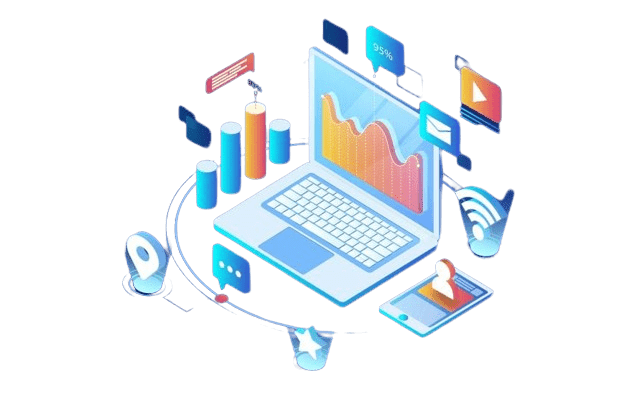Artificial Intelligence (AI) has transitioned from the realm of science fiction to everyday reality, revolutionizing various industries with its current uses of artificial intelligence. From diagnosing diseases to driving cars and creating personalized shopping experiences, AI’s influence is growing by the day. This article explores the current applications of AI and delves into the exciting prospects for its future.
AI in Healthcare: Current Uses of Artificial Intelligence in Diagnostics and Treatment
Diagnostics Tools
One of the most significant impacts of AI is seen in the current uses of artificial intelligence in healthcare diagnostics. AI-powered diagnostic tools, such as IBM Watson Health, have demonstrated remarkable accuracy in identifying diseases. These systems analyze vast amounts of medical data, including patient records and medical literature, to provide doctors with evidence-based recommendations. For instance, AI algorithms can detect early signs of cancer from imaging scans, often with higher accuracy than human radiologists.
Personalized Medicine
AI is also at the forefront of personalized medicine. By analyzing genetic information, lifestyle data, and other health metrics, AI can help create tailored treatment plans for individuals. This approach not only improves the effectiveness of treatments but also minimizes side effects. Companies like Deep Genomics are using AI to predict how genetic mutations will affect health, paving the way for more personalized therapies.
Robotics and Surgery
In the surgical field, AI-driven robotics are enhancing precision and outcomes. Robotic-assisted surgeries, such as those performed with the Da Vinci Surgical System, allow surgeons to operate with greater accuracy and control. These systems can perform complex procedures through tiny incisions, reducing recovery times and improving patient outcomes.

AI in Finance: Current Uses of Artificial Intelligence in Fraud Detection and Trading
Fraud Detection
The financial industry is leveraging AI to enhance security and efficiency. The current uses of artificial intelligence in finance include sophisticated algorithms that excel in detecting fraudulent activities by analyzing transaction patterns and identifying anomalies. This proactive approach helps banks and financial institutions prevent fraud before it occurs, safeguarding both their assets and their customers.
Algorithmic Trading
Algorithmic trading, powered by AI, is revolutionizing stock markets. These systems can analyze market data at lightning speed, making split-second decisions that capitalize on market movements. High-frequency trading algorithms are now a staple in the financial industry, driving significant profits and improving market liquidity.
Customer Service
AI-driven chatbots and virtual assistants are transforming customer service in banking. These intelligent systems can handle a wide range of customer inquiries, from account information to transaction assistance, providing 24/7 support. This not only enhances customer satisfaction but also reduces operational costs for banks.
AI in Transportation: Current Uses of Artificial Intelligence in Autonomous Vehicles and Traffic Management
Autonomous Vehicles
Perhaps one of the most talked-about applications of AI is in autonomous vehicles. Companies like Tesla and Waymo are at the forefront of developing self-driving cars. These vehicles use AI to navigate roads, avoid obstacles, and make real-time decisions, promising to revolutionize transportation by reducing accidents and improving efficiency.
Traffic Management
AI is also playing a critical role in optimizing traffic management. Smart city initiatives use AI to analyze traffic patterns and control traffic lights, reducing congestion and improving the flow of vehicles. Cities like Singapore and Los Angeles are already seeing the benefits of AI-driven traffic management systems.
Predictive Maintenance
In the transportation sector, predictive maintenance powered by AI is becoming increasingly common. Airlines, for instance, use AI to predict when parts need maintenance or replacement, preventing costly breakdowns and ensuring safety. Public transport systems are also adopting similar technologies to maintain reliability and efficiency.

AI in Education: Current uses of Artificial intelligence in personalized learning and enhancing learning methods
Personalized Learning
AI is transforming education by providing personalized learning experiences. Platforms like Khan Academy use AI to tailor educational content to individual students’ needs, helping them learn at their own pace. This personalized approach addresses the unique strengths and weaknesses of each student, making education more effective.
Administrative Efficiency
AI is streamlining administrative tasks in educational institutions. From managing admissions and scheduling to grading assignments, AI systems are reducing the administrative burden on educators. This allows teachers to focus more on teaching and less on paperwork.
Enhancing Learning Methods
Innovative AI applications are enhancing learning methods in classrooms. Virtual reality (VR) combined with AI creates immersive educational experiences that make learning more engaging. For example, students can explore historical events or scientific concepts in a virtual environment, making complex subjects easier to understand.
AI in Retail: Current uses of artificial intelligence for customer insights and enhancing customer experience
Customer Insights
Retailers are using AI to gain deeper insights into customer behavior. By analyzing purchasing patterns and preferences, AI helps retailers understand what their customers want. This information is invaluable for creating targeted marketing campaigns and improving product offerings.
Inventory Management
AI is revolutionizing inventory management by predicting stock needs and optimizing supply chains. Retail giants like Walmart use AI to ensure that shelves are stocked with the right products at the right time, reducing waste and improving customer satisfaction.
Enhancing Customer Experience
AI is enhancing the customer experience in retail through personalized shopping. Chatbots and recommendation engines provide customers with tailored product suggestions, making shopping more convenient and enjoyable. Amazon, for example, uses AI to recommend products based on browsing history and previous purchases.

AI in Entertainment: Current uses of Artificial intelligence for content creations and interactive experiences
Content Creation
AI is making waves in content creation, generating music, art, and writing. AI algorithms can compose music, create visual art, and even write stories. These AI-generated contents are not only entertaining but also push the boundaries of creativity.
Recommendation Systems
Streaming services like Netflix and Spotify use AI to provide personalized content recommendations. By analyzing users’ viewing and listening habits, AI helps these platforms suggest shows, movies, and music that match individual tastes, keeping users engaged and satisfied.
Interactive Experiences
In the gaming industry, AI is creating more interactive and immersive experiences. AI-driven non-playable characters (NPCs) behave more realistically, making games more engaging. Virtual reality games, enhanced with AI, offer incredibly immersive experiences, blurring the line between the virtual and real worlds.
Future Prospects of AI
Emerging Trends
The future of AI holds many exciting possibilities. Emerging technologies such as quantum computing promise to further enhance AI capabilities. Quantum computing can process information at unprecedented speeds, enabling AI to solve complex problems that are currently beyond reach.
Ethical Considerations
As AI continues to evolve, ethical considerations become increasingly important. Issues such as privacy, bias, and accountability need to be addressed to ensure that AI is developed and used responsibly. Regulatory frameworks and ethical guidelines are essential to mitigate risks and ensure fairness.
The Road Ahead
Looking ahead, AI’s impact on society is expected to grow exponentially. From enhancing human capabilities to solving global challenges, AI has the potential to drive significant advancements in various fields. However, it is crucial to navigate the development of AI thoughtfully, balancing innovation with ethical considerations to create a future that benefits all.
Conclusion
The AI revolution is well underway, with the current uses of artificial intelligence transforming industries and improving our daily lives. From healthcare and finance to transportation and entertainment, AI is making a significant impact. As we look to the future, the potential of AI is immense, offering exciting possibilities and challenges. By embracing AI responsibly and ethically, we can harness its power to create a better world.
References
- IBM Watson Health. (n.d.). Retrieved from IBM Watson Health
- Deep Genomics. (n.d.). Retrieved from Deep Genomics
- Tesla. (n.d.). Retrieved from Tesla
- Waymo. (n.d.). Retrieved from Waymo
- Khan Academy. (n.d.). Retrieved from Khan Academy
- Walmart. (n.d.). Retrieved from Walmart
- Netflix. (n.d.). Retrieved from Netflix
- Spotify. (n.d.). Retrieved from Spotify
This article has provided an overview of how AI is currently being used across various industries and explored its future potential. As AI technology continues to evolve, it promises to bring about even more transformative changes, reshaping our world in ways we can only begin to imagine.





Pingback: The Importance of Sustainable Technology in Combating Climate Change - Techy Tempest